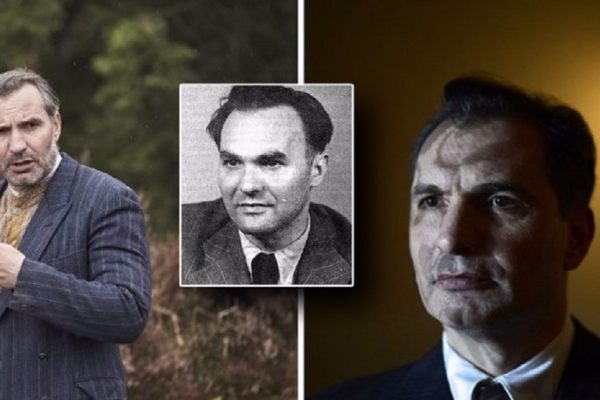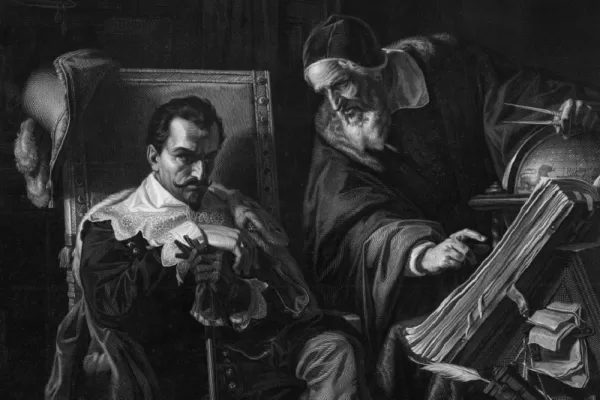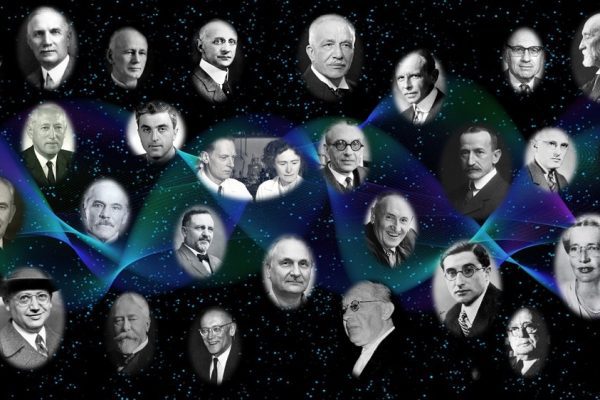Today is the twenty-eighth day of September, the Saint Day of Saint Wenceslas or, in Czech, Svatý Václav. We recommend that you play the following video with sound for the Meditation on old Bohemian Chorale, “St. Wenceslas,” Op. 35a while you read today’s post for some ambiance.
Saint Wenceslas, Duke of Bohemia, was the son of Vratislaus I and Drahomira. His father was a model of all Christian virtues; his mother was the possessor of all vices, besides being a great enemy of the Christian Religion. Vratislaus I, upon his dying bed, gave Wenceslas in charge of his grandmother Ludmilla, while Boleslas (Boleslaus the Cruel), his younger, was kept by Drahomira.
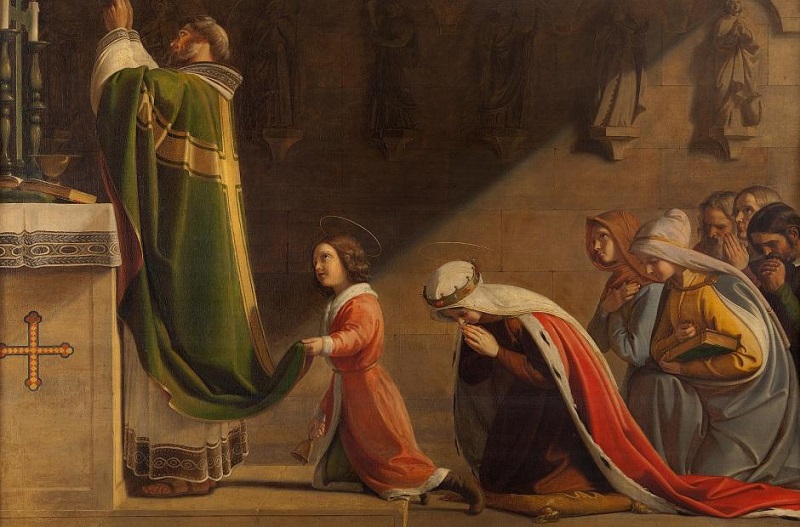

As both women were totally different in their morals, the conduct of the two children became entirely unlike. Wenceslas became pious and holy; Boleslas, godless and licentious. Drahomira seized the government of the state and persecuted the Christians most cruelly. She banished the priests, and dismissed the Christians from all public places, which she filled with heathens of whom the faithful had nothing to expect but cruelty.
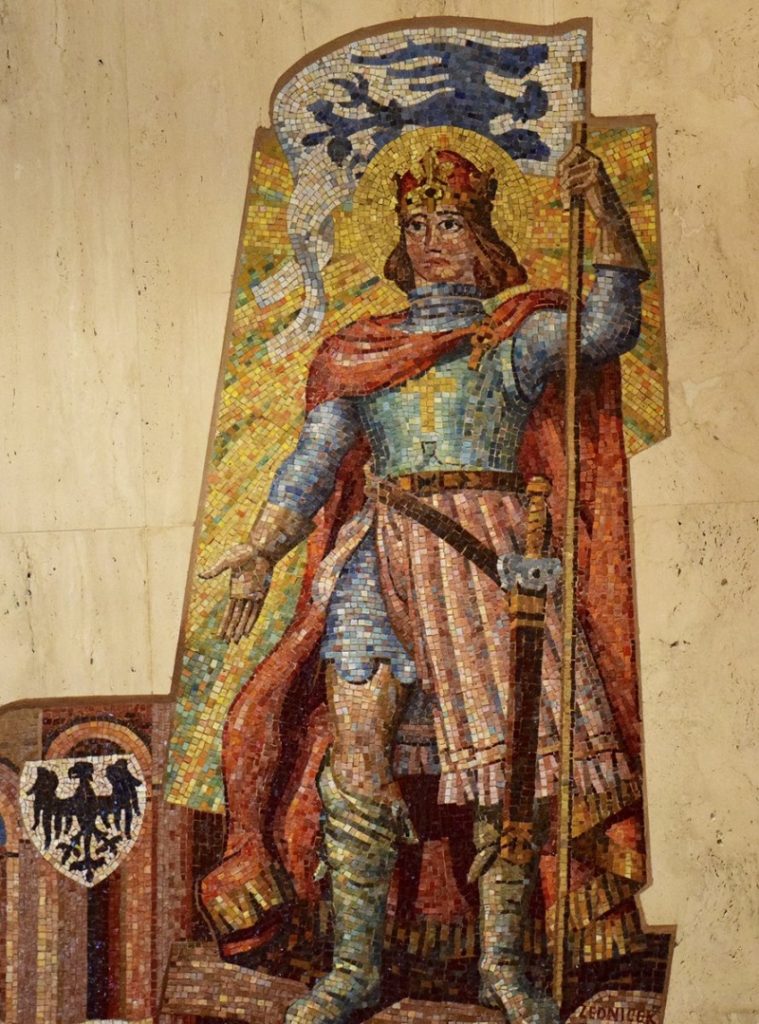

The nobles would not submit to this administration, and deposing Drahomira, placed Wenceslas on the throne and bound themselves to him by an oath of allegiance. Drahomira, burning with rage when she perceived that the pious Ludmilla again protected the Christians, was determined to revenge herself.
She sent some hired assassins who strangled her with her own veil while she was at her devotions in her private chapel. Not satisfied with this murder, Drahomira sought to make away with her son Wenceslas.
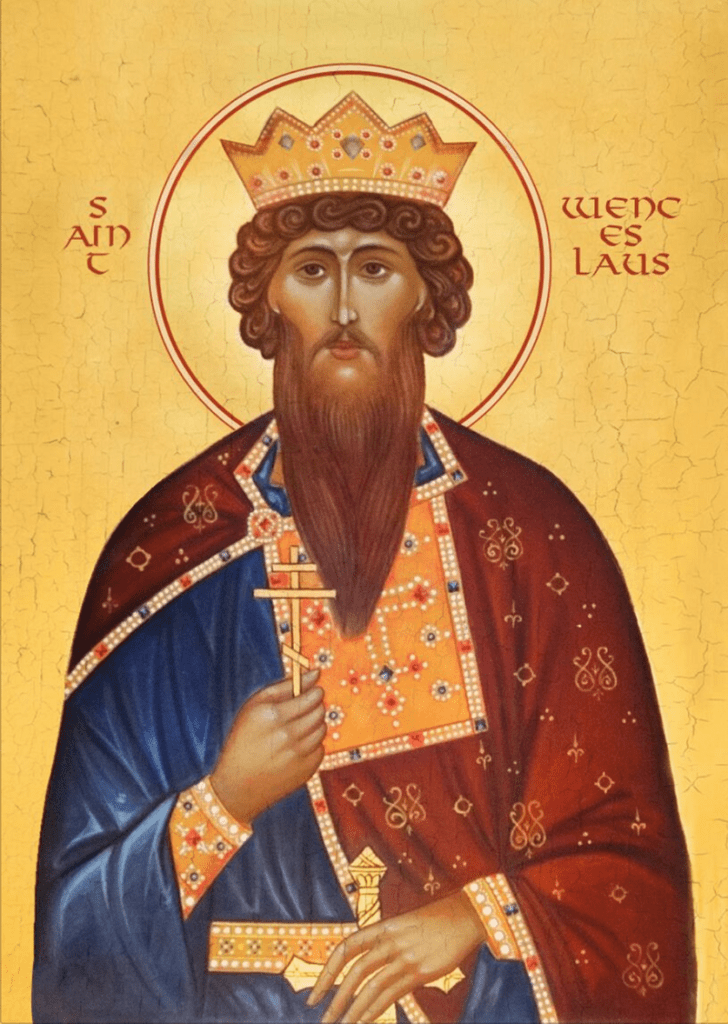

Meanwhile, this holy Prince conducted himself towards God and his subjects in such a manner that Saint Wenceslas was beloved and highly esteemed by every one. He was extremely kind in all his actions, temperate in eating and drinking, unwearied in his care for his subjects, and blameless in his whole conduct.
Saint Wenceslas was so charitable to the poor and prisoners, so compassionate to widows and orphans that the Christian world could count on only a few men like him. The prisoners visited at night and gave them rich alms. He supplied the sick with all they needed and showed a fatherly heart to the widows and orphans.
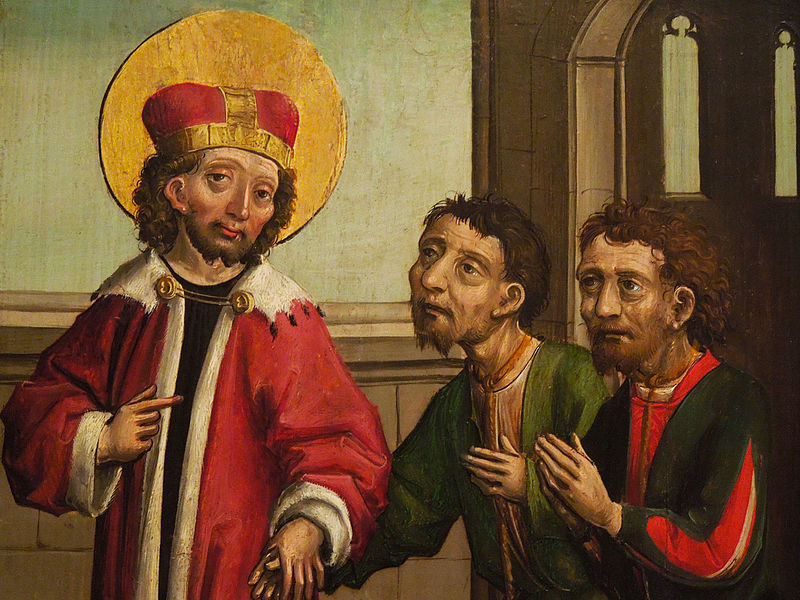

It is known that he himself, at night, carried wood upon his shoulders to the destitute. Not a shadow of impurity tarnished the brightness of his life, and he preserved his chastity unpolluted to his end. Saint Wenceslas gave several hours of prayer daily and, even in winter, frequently visited the Church barefooted at night. One of his servants who accompanied him one day complained of the cold, and the duke told him to step in the footprints which he, walking before him, had made in the snow. The servant did so and no longer felt any cold; for the footprints of the prince were warmed by his love to the Holy Eucharist. (Origin of the Christmas carol and story, Good King Wenceslas.)
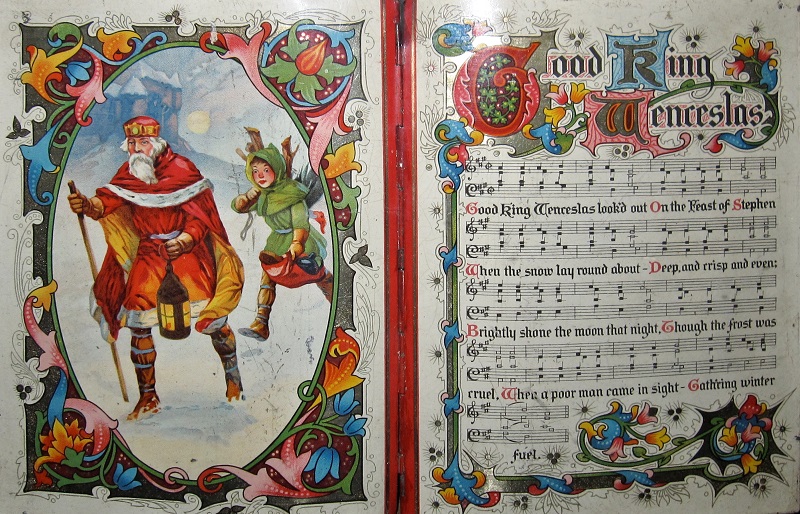

Towards the priests, he was always extremely generous. Saint Wenceslas often served them at the Altar and allowed not the least wrong to be done to them by word or deed. He distinguished himself, especially in his devotion to the Holy Mass at which he daily assisted. He sowed, gathered, and prepared with his hands, the wheat used in making the Hosts; and cultivated and pressed the grapes for the wine used at Holy Mass. In one word, Wenceslas reigned and lived like a Saint.
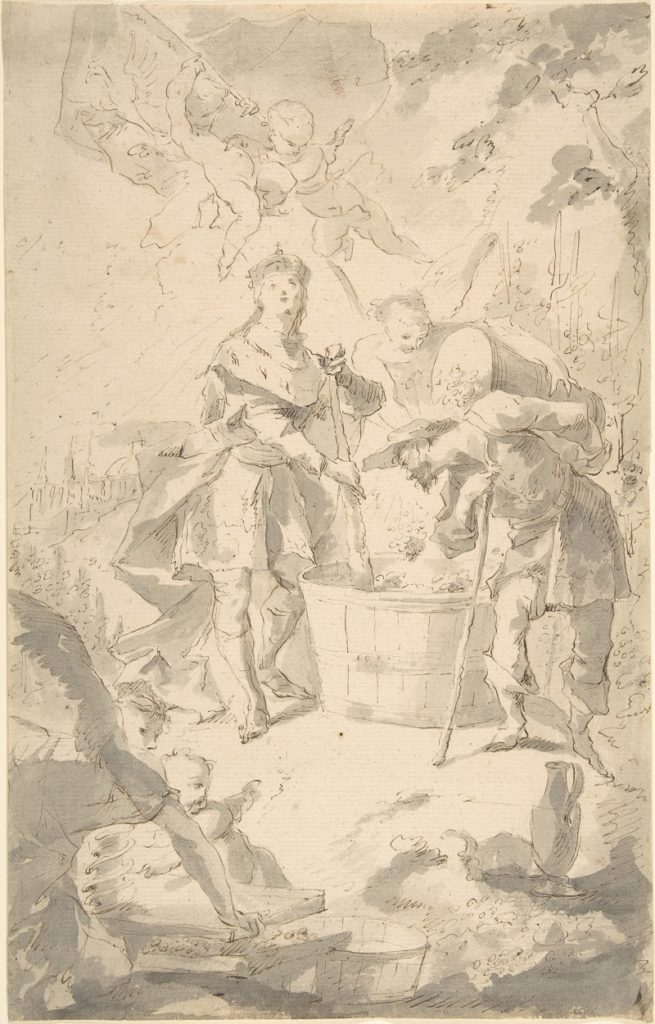

Count Radislas, scorning the piety of the duke, caused the people to rebel and marched against Wenceslas. The latter, sending him a deputation, made offers of peace, but Radislas would not even listen to the king’s message, esteeming it a sign of Wenceslas’s cowardice. Hence, the holy duke was forced to meet him at the head of his army.
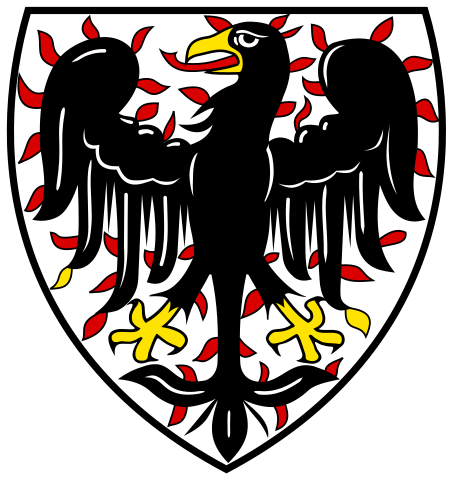

The two armies were drawn up opposite each other in battle array when Wenceslas, sad that so much innocent blood should be shed, and being willing rather to give his own than that of his subjects, challenged Radislas to single combat, with the condition that the victory should be on the side of him who should slay his adversary. Radislas accepted the challenge and, spear in hand, galloped in full armor toward the Saint. The latter was also clad in armor but carried only a sword.
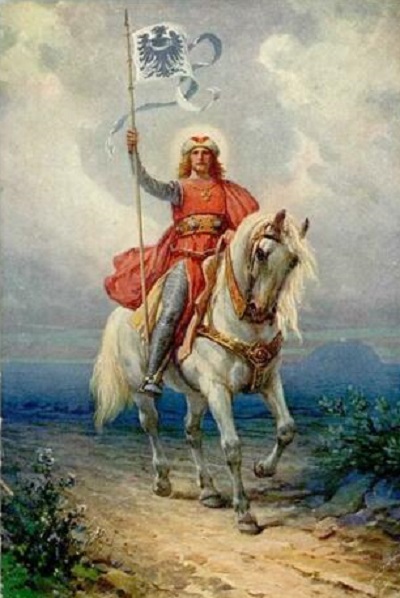

Radislas intended to unhorse Wenceslas with his spear and thus have him in his power. The Saint went to meet him, making the sign of the cross. At the moment when Radislas was about to thrust his spear, he saw, by the side of Wenceslas, two angels who cried to him: “Stand off!”
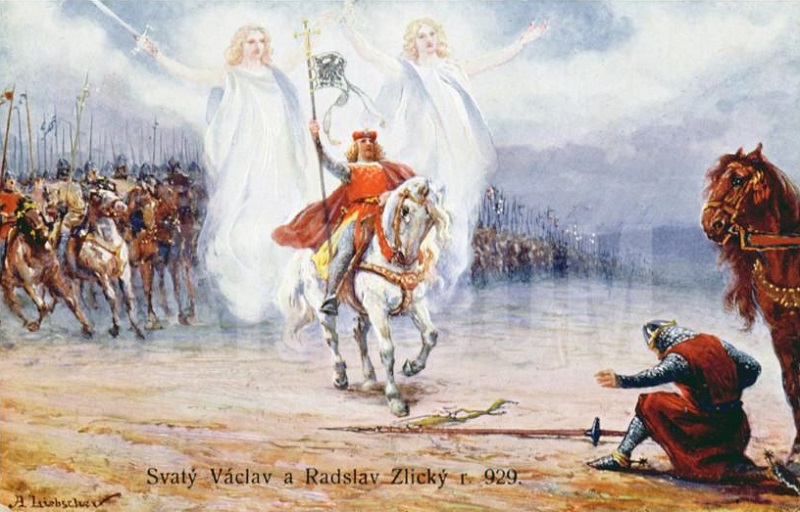

This cry acted like a thunderbolt upon Radislas and changed his intentions. Throwing himself from his horse, he fell at the Saint’s feet, asking for grace and pardon, promising obedience in the future. Wenceslas raised him from the ground and kindly received him again in favor.
Soon after, the duke was summoned to Worms to assist with the general Diet. The emperor and all the princes and dignitaries were already assembled, but Wenceslas had not yet appeared as he was detained by hearing Mass. Thinking that his delay was intentional and caused by pride, they determined to receive him very coldly and without the honor he had a right to expect But when the Saint entered the hall, Otho, the emperor, saw two angels accompanying him, carrying before him a golden cross.
When the Emperor had recovered from the awe with which this sight had inspired him, he arose from his throne, and, going towards the Saint, he led him to the seat prepared for him. The entire assemblage was greatly astonished at this act of the emperor, but when he related what he had seen, they all regarded the Saint with the greatest reverence.
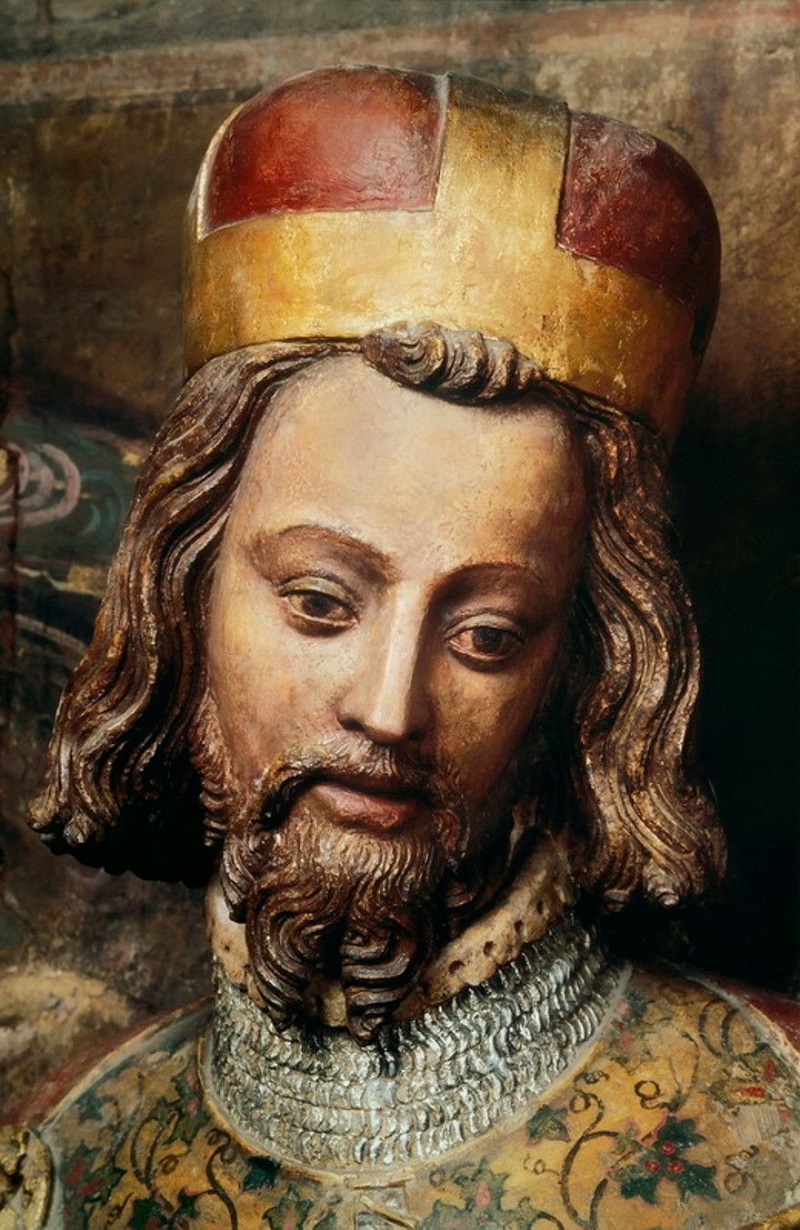

The emperor also bestowed royal dignity and power on Wenceslas and presented him with the arm of the holy martyr, St. Vitus. Wenceslas received gratefully and with due respect and took him to Bohemia. At the close of the Diet, the Saint returned as king and continued his holy life.
The more the pious monarch was loved and honored by his subjects because of his holiness and new dignity, the more hostile Drahomira and Boleslas grew toward him. Wenceslas, who perceived this, determined to resign his crown. But the wicked Drahomira would not wait for this. Boleslas had become the father of a son, and Wenceslas was invited to be present at the baptism of the young prince.
Although the holy king had reason to suppose that this invitation covered other intentions, he accepted it in order not to manifest any distrust of his brother. Having gone to confession and Holy Communion, he went fearlessly to the palace of Boleslas. He was received with great honor and magnificently entertained. At midnight, before the banquet ended, the Saint quietly left the hall and went into the Church according to his custom. Drahomira seized this opportunity and, calling Boleslas aside, told him that the time was now come when he could avenge himself and make the royal crown his own.
The blood-thirsty tyrant needed no persuasion. Seizing his sword, he hastened, with some attendants, into the Church and stabbed his holy brother with such brutal force that the blood bespattered the wall, where it is yet to be seen to this day.
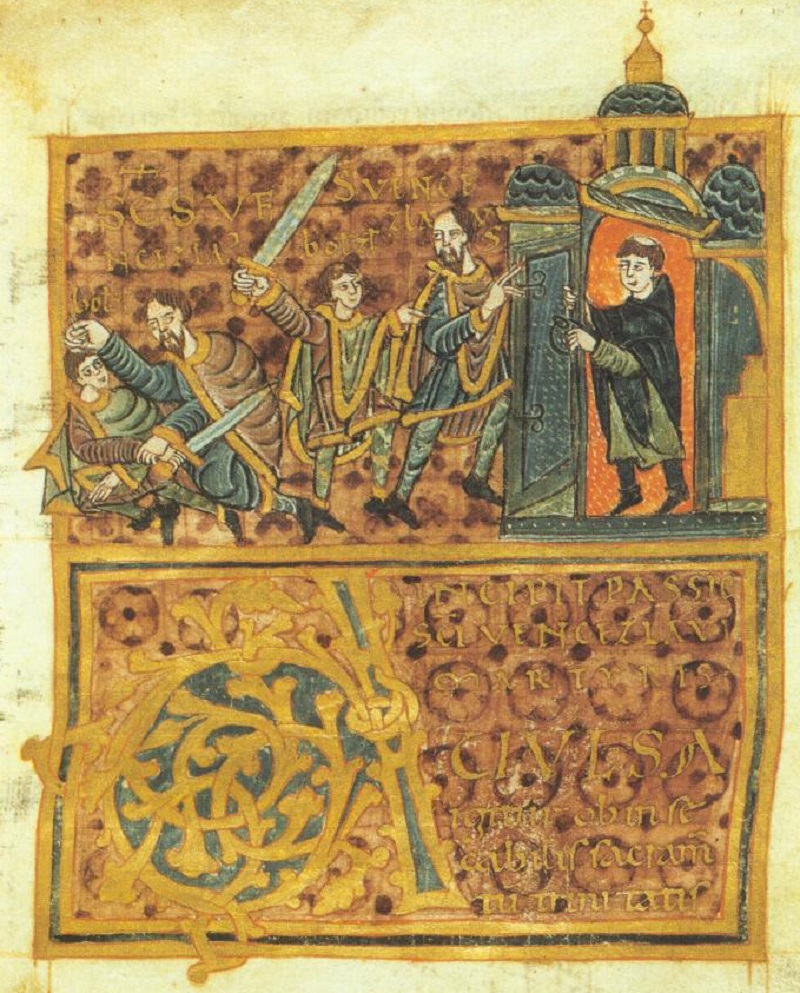

But the punishment of God soon overtook the murderers. The earth opened and swallowed Drahomira, the instigator of the sinful deed, with her horse and carriage, in that part of Prague which is called the castle of Ratschin. Of the murderers who were with Boleslas when he committed the crime, some lost their reason, while the rest died by their own hands. Although God delayed the punishment of Boleslas, it came at last. Having long been tormented by most painful maladies, at length, he expired in all his wickedness.
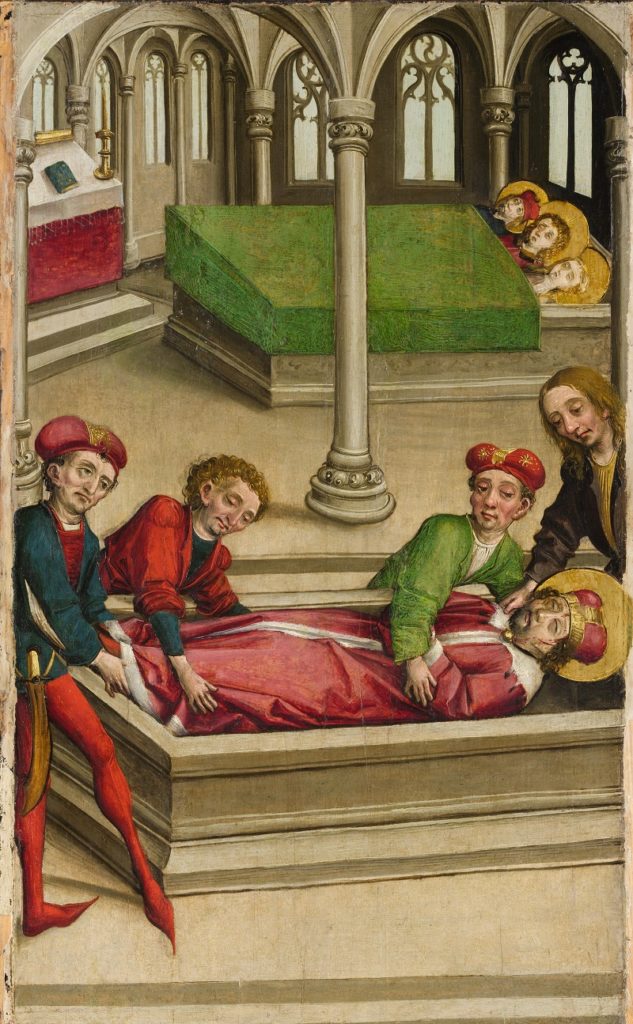

The shrine of the holy king Wenceslas was honored with many miracles after God had crowned his virtuous soul with everlasting glory in the kingdom of Heaven.
Play this short video (less than 2 minutes) to hear a short English-speaking story about St. Wenceslaus.
Wenceslaus I, Wenceslas I or Václav the Good, was the Duke of Bohemia from 921 until his assassination in 935.
Paganism vs. Christianity in the Family
Born in 907 or 911, Wenceslas was a member of the Přemysl dynasty that ruled Bohemia from the ninth century to 1306. His father was the founder of the Přemyslids, Bořivoj I, the Duke of Bohemia from 870 to 889, who installed Christian values in his son. Wenceslas’ mother, Drahomíra, came from a pagan background but was baptized when she married Bořivoj, according to some sources. Still, in many legends, she fervently clung to her pagan roots. Wenceslas was an impressionable 13-year-old when his father died, and then it was his grandmother Ludmila’s turn to raise him. However, Drahomíra argued with Christian subjects and aspired to gain recognition from the nobility. Because Ludmila had encouraged Wenceslas in Christian beliefs, Drahomíra had Ludmila killed on September 15, 921, and Ludmila became a saint. Drahomíra decided it was high time her son became a pagan, but she found it impossible to persuade Wenceslas. In fact, during 924 or 925, Wenceslas sent her out of the country.
(Saint) Wenceslaus I, Wenceslas I or Václav the Good (c. 907 or 911 – September 28, 935), was Bohemia’s duke (kníže) from 921 until his assassination in 935. His martyrdom and the popularity of several biographies gave rise to a reputation for heroic virtue that resulted in his elevation to sainthood. Although Wenceslas was only a duke during his lifetime, Holy Roman Emperor Otto I posthumously “conferred on Wenceslas the regal dignity and title” of the king, which is why he is referred to as “king” in legend and song. (Source: Mershman, Francis. “St. Wenceslaus.” The Catholic Encyclopedia Vol. 15. New York: Robert Appleton Company, 1912.) He is seen as the patron saint of the Czech state.
FATHER: Vratislaus I (c. 888 – 13 February 921), Duke of Bohemia from the Přemyslid dynasty.
MOTHER: Drahomíra (c. 877 or 890 – died after 934 or 936), Drahomíra was born in the present-day Havelland region centered around the fortress of Brandenburg (Brennabor), the daughter of a Hevelli (Stodoran) pagan tribal chief. According to Cosmas of Prague, she married Duke Vratislav I of Bohemia about 906 and was baptized at the time of her marriage. Drahomíra gave birth to at least six children: her sons were Wenceslaus and Boleslaus, who both succeeded their father as Bohemian dukes.
BROTHER: Boleslaus I the Cruel, also called Boleslav I (c. 915 – 15 July, 967 or 972), a member of the Přemyslid dynasty, was the ruler of the Duchy of Bohemia from 935 to his death. He is notorious for the murder of his elder brother Wenceslaus, through which he became duke.
PATERNAL GRANDMOTHER: Ludmila of Bohemia (c. 860 – 15 September 921), Ludmilla ensured he was educated in the Old Slavonic language. Ludmilla and Bořivoj I were succeeded by their son Spytihněv. Spytihněv was succeeded by his brother Vratislav. When Vratislav died in 921, his son Wenceslas became the next ruler of Bohemia. It had been mainly Ludmila who raised her grandson, and she now acted as regent for him.
PATERNAL GRANDFATHER: Bořivoj I of Bohemia (c. 852 – c. 889) was the first historically documented Duke of Bohemia and progenitor of the Přemyslid dynasty. His reign over the Duchy of Bohemia is believed to have started about the year 870, but in this era, Bohemia was subordinated to Great Moravia. One of the most important clues to the approximate time of his accession is the contemporary Frankish chronicle Annales Fuldenses, which mentions several West Slavic princes in the year 872, among them one Goriwei, who may be identical to Bořivoj.
Paganism to Christianity: Bořivoj I and Ludmilla were converted to Christianity through the efforts of Saint Methodius. However, their efforts to convert Bohemia to Christianity were initially not well received, and they were driven from their country for a time by the pagans.
Saints Cyril and Methodius were two brothers who were Byzantine Christian theologians and Christian missionaries. Through their work, they influenced the cultural development of all Slavs, for which they received the title “Apostles to the Slavs.” They are credited with devising the Glagolitic alphabet, the first alphabet used to transcribe Old Church Slavonic language.
FURTHER ANCESTRY: According to the early 12th-century Chronica Boëmorum, Bořivoj was a son of the legendary Bohemian prince Hostivít, thus a descendant of Queen Libuše and her husband Přemysl the Ploughman. His ancestry has not been conclusively established by historians, however. In view of his dependence on Great Moravia, he might have been related by blood to the Mojmir dynasty.
Practical Considerations for Religious Readers
I. Of the many great virtues of St. Wenceslas, which I have represented to you, I particularly desire that you should take to heart his devotion to the holy sacrifice of the Mass and his reverence for the servants of God, the priests. Not everyone can imitate him in raising the wheat and wine for the use of the holy sacrifice, but everyone can imitate him in the devotion with which he daily assisted at holy Mass, a devotion which we cannot sufficiently admire when we think of the many important affairs which he, as duke and king, had to transact in governing his state.
What have you to say to this who is not so burdened with business as he was and who pretends you have no time? If your regard for holy Mass were as great as that of St. Wenceslas, you would most assuredly not speak thus. Consider what holy faith teaches you of it, and you will esteem it more highly and not so easily allow a day to pass without attending Mass. Fear not that by it, you will suffer loss or neglect your business. Time thus given to the Almighty will be an advantage to you and bless your affairs. Determine, therefore, to assist at Mass daily, or at least as often as you can, but resolve at the same time that this shall be done with due reverence, as the holy king did it. Far be it from you to talk, to look curiously about, to be irreverent in your manner, or to do anything that is displeasing in the eyes of God. Appear before God as a beggar should appear before the Lord of heaven and earth, a poor sinner before his mighty Judge, a miserable worm before the Creator of all that exists. For the Church is, in truth, the house of God and the gate of heaven.
II. I wish you would follow his example in the respect the holy king manifested towards the priests. Priests are God’s ambassadors; they are Christ’s deputies to teach us the word and will of the Almighty. From them, we have to seek pardon for our sins, according to the institution of the Saviour. Are not these sufficient reasons to honor them? Whoever refuses due honor to the ambassador of a monarch refuses it to the monarch himself, and the wrong done to the former is received by the latter as if it had been done to himself. Do you not think it will be the same with honor or dishonor done to the priests? Endeavor, therefore, to give them due respect and honor. Be not one of those who speak abusively and irreverently about priests and their actions, who make their faults known everywhere, or even charge them with innocent vices. Should a priest have done wrong, it is not for you to despise him as an ambassador of God.
Many ambassadors of temporal powers have their faults, but we dare not insult them because they are royal ambassadors. Priests are ambassadors of the Most High, and you owe them special honor on account of this high dignity. If those who speak so disrespectfully of priests would consider their own great faults, they would surely come to the conclusion that they have no reason to slander the anointed of the Lord. “They are like those hypocrites,” says St. Gregory, ” who carry a large beam in their own eyes without seeing it but who notice a splinter in the eyes of others.” Pay attention to the further remarks of the same holy Father: “If it is a just law that those shall be severely punished, who, by offending a royal ambassador, have become guilty of offending the majesty of a king, how will those fare who have despised the Divine Majesty in His priest?”
Source: Lives of the Saints by Franz X. Weninger, 1876.
A poem:
Now just metal,
Hollow and thoughtless,
You remain with us.
At most, occasionally
(once every twenty years),
You still serve us
As a symbol of protest.
Back then, we were truly desperate,
But your spirit
We have long lost.
Your God has vanished,
We don’t even know when,
From your former kingdom,
And your call for peace with enemies? –
We have broken it more than three million times!
So there’s no need to be surprised at all
That we have become such an easy prey
For the descendants of Genghis Khan.
It seems, therefore,
That first we must uncover
Boleslaus within ourselves.
Only then will it make sense
To knock on the metal of your horse,
So that from your trembling face,
We can learn
Human expression.
(Josef Tomáš – October 1982)
Other posts we’ve written about Saint Wenceslas
- Good King Wenceslas and his Descendant (Charles IV)
- Celebrating St. Wenceslas Day
- David Černýs St. Wenceslas in The Lucerna Passage
- Church of St. Wenceslas in Vrsovice, Prague
We tirelessly gather and curate valuable information that could take you hours, days, or even months to find elsewhere. Our mission is to simplify your access to the best of our heritage. If you appreciate our efforts, please consider donating to support this site’s operational costs.
See My Exclusive Content and Follow Me on Patreon
You can also send cash, checks, money orders, or support by buying Kytka’s books.
Your contribution sustains us and allows us to continue sharing our rich cultural heritage.
Remember, your donations are our lifeline.
If you haven’t already, subscribe to TresBohemes.com below to receive our newsletter directly in your inbox and never miss out.


